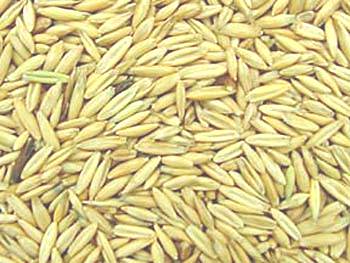Cereals – Oats
 Oats are a cool-season crop growing mainly in northern Europe (Russia is the main producer), probably since 1000 bc. Grown mainly as an animal feed, the grain has seen an upsurge in use as a human foodstuff as various beneficial properties have been ascribed to it. After threshing the hulls are removed by milling, leaving the whole of the groat, which is usually used in human foodstuffs. Oatmeal, or “pinhead oats”, is produced by cutting the groat into sections, and may be used for making porridge and in cakes, biscuits, etc. Flaked or rolled oats are the most familiar form, and are produced by passing steam-cooked groats or pieces of groat between heavy flaking rollers. The steam process completes the inactivation of enzymes in the oats that can cause rancid flavors due to breakdown of fat, and also helps gelatinize the starch so that less cooking is needed at home. Thin, fine flakes made from pinhead require less cooking than the large, thick jumbo oat which result from large whole groats. Oat bran is produced by removing most of the endosperm, leaving the pericarp, which contains a high proportion of non-starch polysaccharides (dietary fiber). Oat flours resulting from this process are used to make extruded breakfast cereals. Rolled oats (or whole groats) may be used in muesli-type cereals and coked to make porridge.
Oats are a cool-season crop growing mainly in northern Europe (Russia is the main producer), probably since 1000 bc. Grown mainly as an animal feed, the grain has seen an upsurge in use as a human foodstuff as various beneficial properties have been ascribed to it. After threshing the hulls are removed by milling, leaving the whole of the groat, which is usually used in human foodstuffs. Oatmeal, or “pinhead oats”, is produced by cutting the groat into sections, and may be used for making porridge and in cakes, biscuits, etc. Flaked or rolled oats are the most familiar form, and are produced by passing steam-cooked groats or pieces of groat between heavy flaking rollers. The steam process completes the inactivation of enzymes in the oats that can cause rancid flavors due to breakdown of fat, and also helps gelatinize the starch so that less cooking is needed at home. Thin, fine flakes made from pinhead require less cooking than the large, thick jumbo oat which result from large whole groats. Oat bran is produced by removing most of the endosperm, leaving the pericarp, which contains a high proportion of non-starch polysaccharides (dietary fiber). Oat flours resulting from this process are used to make extruded breakfast cereals. Rolled oats (or whole groats) may be used in muesli-type cereals and coked to make porridge.
Of the cereals, oats have the highest level of both protein (up to 20%, according to cultivar) and fat (5-9%). The fat in oats is also mainly unsaturated and the cereal supplies a range of B vitamins. Over recent years it has been demonstrated that consumption of rolled oats (in amounts of about 125-150 g per day), or oat bran in smaller amounts, will lower blood cholesterol levels, especially in people who have high initial levels. It is thought that the beta-glucan part of the non-starch polysaccharides in oats is largely responsible for this effect. In the USA the Food and Drug Administration have allowed a health claim to this effect: a sample claim would be:
“diets low in saturated fat and cholesterol that include 3 g of soluble fiber from whole oats per day may reduce the risk of heart disease. One serving of this whole-oats product provides x g of this soluble fiber.”

